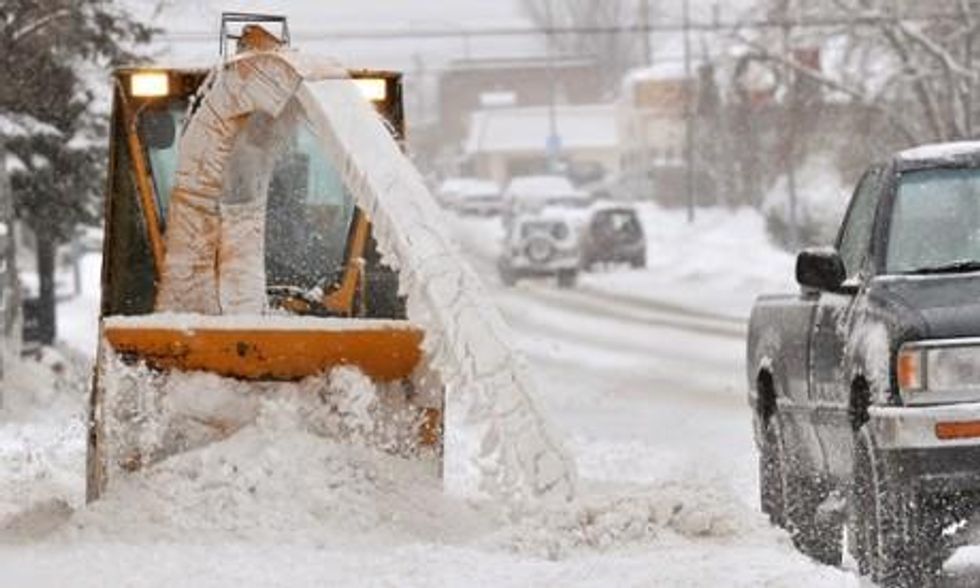

SUBSCRIBE TO OUR FREE NEWSLETTER
Daily news & progressive opinion—funded by the people, not the corporations—delivered straight to your inbox.
5
#000000
#FFFFFF
To donate by check, phone, or other method, see our More Ways to Give page.


Daily news & progressive opinion—funded by the people, not the corporations—delivered straight to your inbox.

"The jet stream, a ribbon of high altitude, high-speed wind in northern latitudes that blows from west to east, is formed when the cold Arctic air clashes with warmer air from further south," Agence France-Presse explains. "The greater the difference in temperature, the faster the jet stream moves." Because the air coming from the Arctic is warming, the jet stream has weakened and "has begun to meander, like a river heading off course."
"Weather patterns are changing," said Jennifer Francis, a climate expert at Rutgers University, at the meeting. "We can expect more of the same and we can expect it to happen more frequently."
Temperatures in the Arctic have been rising "two to three times faster than the rest of the planet," said James Overland, a weather expert with the National Oceanic and Atmospheric Administration (NOAA).
This trend could in turn see the increasingly harsh winters in Northern U.S. and Europe continue into the unforeseeable future.
______________________
Dear Common Dreams reader, The U.S. is on a fast track to authoritarianism like nothing I've ever seen. Meanwhile, corporate news outlets are utterly capitulating to Trump, twisting their coverage to avoid drawing his ire while lining up to stuff cash in his pockets. That's why I believe that Common Dreams is doing the best and most consequential reporting that we've ever done. Our small but mighty team is a progressive reporting powerhouse, covering the news every day that the corporate media never will. Our mission has always been simple: To inform. To inspire. And to ignite change for the common good. Now here's the key piece that I want all our readers to understand: None of this would be possible without your financial support. That's not just some fundraising cliche. It's the absolute and literal truth. We don't accept corporate advertising and never will. We don't have a paywall because we don't think people should be blocked from critical news based on their ability to pay. Everything we do is funded by the donations of readers like you. Will you donate now to help power the nonprofit, independent reporting of Common Dreams? Thank you for being a vital member of our community. Together, we can keep independent journalism alive when it’s needed most. - Craig Brown, Co-founder |

"The jet stream, a ribbon of high altitude, high-speed wind in northern latitudes that blows from west to east, is formed when the cold Arctic air clashes with warmer air from further south," Agence France-Presse explains. "The greater the difference in temperature, the faster the jet stream moves." Because the air coming from the Arctic is warming, the jet stream has weakened and "has begun to meander, like a river heading off course."
"Weather patterns are changing," said Jennifer Francis, a climate expert at Rutgers University, at the meeting. "We can expect more of the same and we can expect it to happen more frequently."
Temperatures in the Arctic have been rising "two to three times faster than the rest of the planet," said James Overland, a weather expert with the National Oceanic and Atmospheric Administration (NOAA).
This trend could in turn see the increasingly harsh winters in Northern U.S. and Europe continue into the unforeseeable future.
______________________

"The jet stream, a ribbon of high altitude, high-speed wind in northern latitudes that blows from west to east, is formed when the cold Arctic air clashes with warmer air from further south," Agence France-Presse explains. "The greater the difference in temperature, the faster the jet stream moves." Because the air coming from the Arctic is warming, the jet stream has weakened and "has begun to meander, like a river heading off course."
"Weather patterns are changing," said Jennifer Francis, a climate expert at Rutgers University, at the meeting. "We can expect more of the same and we can expect it to happen more frequently."
Temperatures in the Arctic have been rising "two to three times faster than the rest of the planet," said James Overland, a weather expert with the National Oceanic and Atmospheric Administration (NOAA).
This trend could in turn see the increasingly harsh winters in Northern U.S. and Europe continue into the unforeseeable future.
______________________